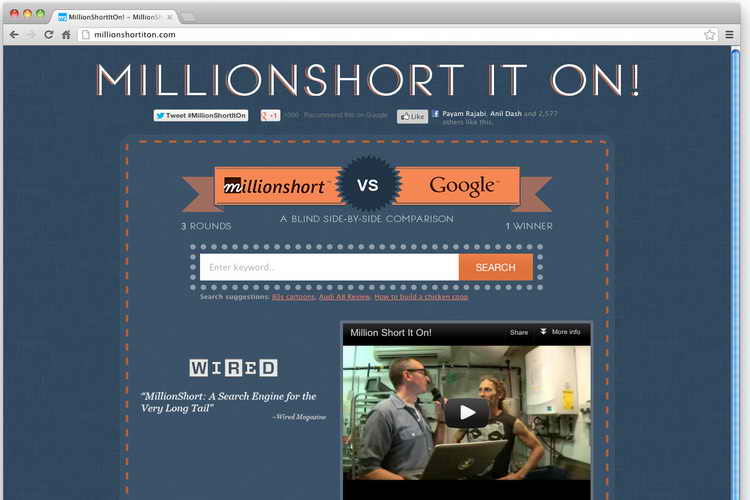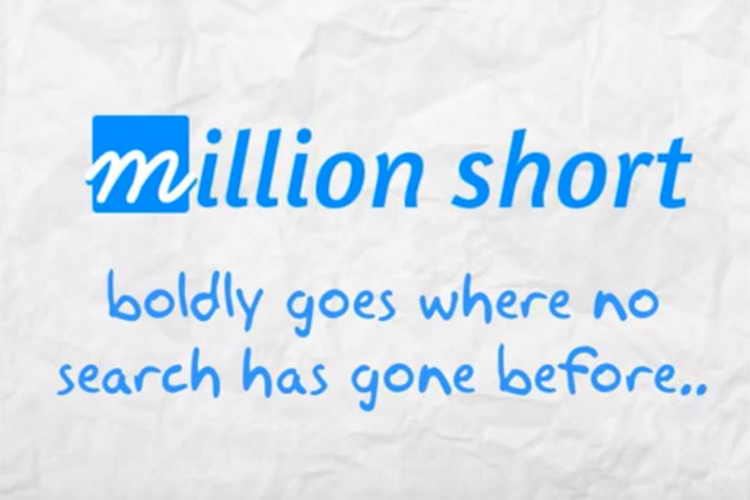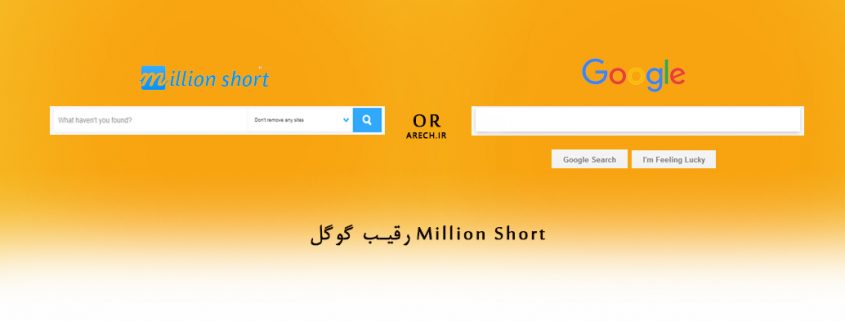Million Short رقیب گوگل
استارتاپ میلیون شرت (Million Short) که در سال ۲۰۱۲ تأسیس شده است، موتور جستجویی راهاندازی کرده که از یک روش جدید و متمرکز برای سازماندهی، دسترسی و کشف دادهها در اینترنت استفاده میکند. این پلتفرم، با گسترش دسترسی عمومی به دادههای آنلاین، گزینههای وسیعتری در جستجوی اطلاعات کاربران، به نمایش میگذارد.
میلیون شرت با دور زدن موتورهای جستجوی مشهور، سایتهای پربازدید و گزینههایی که با حمایتهای مالی در صفحهی اول نتایج قرار میگیرند، در هر جستجوی کاربران، یک میلیون سایت را به آنها معرفی میکند. این شرکت امیدوار است زمین بازی را برای وبسایتهای جدیدی که به هر دلیلی از سئوی ضعیفتر برخوردارند، کلمات رقابتی بیشتری دارند یا با یک بودجهی بازاریابی پایین اداره میشوند، متعادل کند.
سانجای آرورا، مؤسس و مدیرعامل میلیون شرت، در مصاحبهای با نشریهی فوربز، چشمانداز شرکت خود را به اشتراک گذاشته است. آنچه در ادامهی این مطلب میخوانید، صحبتهای او در مورد غلبه کردن بر بازار انحصاری گوگل و آیندهی جستجوی آنلاین اطلاعات است:
سانجای آرورا: اهمیت جستجوی آنلاین بیش از آن است که تحت کنترل چند شرکت شناختهشده باقی بماند و واقعیت این است که من اصلاً اطمینان ندارم که دانش و هنری که پشت این موتورهای جستجو وجود دارد، کامل و بینقص است. در این حوزه هنوز فضای زیادی برای نوآوری، الگوریتمهای جدید، رابطهای کاربری و فیلترهای نوین مرتبسازی اطلاعات وجود دارد. یک فرصت فوقالعاده پیش روی ما است. چرا به تعداد انگشتشماری از شرکتها اجازه دادهایم دانشی را که میتوانیم از اینترنت کسب کنیم، کنترل کنند؟ من معتقدم مردم جهان به موتورهای جستجوی بیشتری نیاز دارند. هدف ما این است که با ارائه روشهای جایگزین برای سازماندهی، دسترسی و کشف طیف وسیعتری از وبسایتها، مسیرها و اطلاعاتی را به مردم نشان دهیم که پیشازاین کمتر دیده شدهاند.
موتور جستجوی شما چگونه کار میکند و چه مزایایی برای کاربران دارد؟
سانجای آرورا: با توجه به اهدافی که در مورد آن صحبت کردیم، ما میخواهیم موتور جستجوی وب عمیق باشیم. زمانی که کاربران از موتورهای جستجوی سنتی استفاده میکنند، فقط عملیات جستجو را «اجرا» میکنند؛ درحالیکه میلیون شرت به آنها اجازه میدهد عملیات را «کنترل» کنند. بهعنوان مثال آنها میتوانند با حذف وبسایتهای مشهور از نتایج جستجو، به کشف محتوای معتبری بپردازند که ممکن بود برای همیشه زیر صدها صفحهی نتایج، مدفون بماند.

لطفاً مدل کسبوکارتان را شرح دهید. مهمترین اجزای این مدل چیست؟
سانجای آرورا: تعیین یک مدل کسبوکار، یکی از بزرگترین چالشهای ما است. ما هنوز تلاش میکنیم جزئیات مدل کسبوکارمان را تکمیل کنیم. ولی بهطور مشخص، جریان اصلی درآمد ما از تبلیغات حاصل میشود. البته ایدههای دیگر هم برای کسب درآمد در ذهن داریم. مثلاً میتوانیم از کاربران B2B، حق اشتراک بگیریم.
بزرگترین نقطهضعف این حوزه چیست و شرکت شما چه راه حلی برای این مشکلات ارائه میکند؟
سانجای آرورا: از نظر من، نقطهی کور فضای جستجو، کمبود گزینههای انتخابی است. محدودیت انتخاب نهتنها در تنوع موتورهای جستجو دیده میشود، بلکه در نتایج جستجو نیز خودش را نشان میدهد. گوگل روی بخش اعظم بازارهای جستجو تسلط دارد و این بهخودیخود یک نقطهضعف محسوب میشود. ما امیدواریم نوآوریهای که عرضه میکنیم، تا حد زیادی این مشکل را کنار بزند.
چگونه میزان موفقیت و تأثیر شرکتتان را میسنجید؟
سانجای آرورا: تیم ما از تعدادی توسعهدهندهی برتر تشکیل شده است که فوقالعاده مشتاقاند محصولی عرضه کنند که جایگزین خوبی برای گوگل باشد. ما مدام از کاربرانمان درخواست بازخورد میکنیم تا متوجه شویم میلیون شرت میتواند به آنها کمک کند یا خیر. موفقیت ما در ویژگیهای پیشرفتهای که بهصورت بهروزرسانی به وبسایتمان اضافه میشود، نمود پیدا میکند. درنهایت افزایش تعداد کاربران و همچنین افزایش میزان درآمد و سوددهی شرکت هم فاکتورهای دیگری هستند که موفقیت ما را تأیید میکنند.

تجربیات پیشین شما در عرصهی کارآفرینی، چه تأثیری روی راهاندازی شرکت جدید داشت؟
سانجای آرورا: من بیش از ۲۰ سال است که کارآفرین هستم. دو شرکت سابق من، ارائهکنندهی خدمات نرمافزاری B2B بودند و بر مبنای همین فرضیهی اصلی، یعنی ارائهی یک موتور جستجوی جایگزین، فعالیت میکردند. این دو شرکت بهنوعی زیرساختهای میلیون شرت محسوب میشوند. راهاندازی و ادارهی اولین شرکتم به من فرصت داد روی ایدههای موردعلاقهام کار کنم. من یاد گرفتم که به کمک اراده و صبر و همچنین پر کردن اطرافم با افراد مستعد (و البته کمی چاشنی شانس!)، میتوانم به موفقیتهای بزرگ دست پیدا کنم.
کلیدهای مقیاسپذیری و پایداری در صنعتی که دائماً در حال تغییر است، چیست؟
سانجای آرورا: امروزه فضای ابری مقیاسپذیری یک موتور جستجو را بسیار ساده کرده است؛ ولی پایداری قسمت سخت کار ما محسوب میشود. برای من کلید پایداری سرعت عمل است. یعنی چقدر سریع میتوانیم ویژگیهای جدید و مفیدی توسعه دهیم و به محصولمان اضافه کنیم و چقدر در نوآوریهایمان موفقیم.
جایگاه شرکت خود را در سه تا پنج سال آینده، کجا میبینید؟ پیشبینی میکنید چقدر در این صنعت تأثیرگذار خواهید بود؟
سانجای آرورا: ما محصولات جدیدی به بازار عرضه میکنیم. در حال حاضر مشغول کار روی یک نسخهی مخصوص کودکان هستیم. من خودم سه فرزند دارم و نگاه میکنم که آنها چطور از این محصول برای جستجو در کلاسهای درس استفاده میکنند. مشکلاتی که اخیراً برای یوتیوب به وجود آمد، مرا به راهاندازی این نسخه مصممتر کرد. اگر بتوانیم برنامههای توسعه و بازاریابیمان را بهخوبی اجرا کنیم، تا پنج سال آینده به یک برند خانوادگی تبدیل خواهیم شد.
This Search Engine Startup Helps You Find What Google Is Missing
With the 2018 edition of the Consumer Electronics Show set to open this Monday, Google has been setting up a very complex display for the large number of attendees that will be passing through the Las Vegas Convention Center. With the phrase “Hey Google” written on the side of the city’s monorail cars, and seen on various billboards around town, Google will apparently be heavily promoting Google Assistant at CES this year. A rivalry of sorts has developed between Google’s virtual personal assistant, and Amazon’s Alexa.
Amazon’s Alexa personal assistant saw its usage triple from May 2016 to May 2017, and not all of the increase was due to the jump in smart speaker sales. Alexa ended up as an option on the HTC U11, the Huawei Mate 9, and on Moto Z series phones sporting a particular Moto Mod. Since Alexa got off to a great start in 2017 with several announcements made at CES, Google is hoping to get Google Assistant off to a strong start in Vegas this year.
Google now allows users to wake/activate Google Assistant by using the “Hey Google” hotword in addition to “Ok Google.” The latter has been around for some time. Alexa users simply say “Alexa,” followed by the task or inquiry they want her to handle.
Alexa might have already stolen some thunder from Google Assistant this year by recently announcing the Alexa Mobile Accessory Kit. This allows developers to add Alexa to headphones, smartwatches and fitness trackers.
Google apparently has something big in mind for Google Assistant that will be unveiled at CES. Keep checking in to PhoneArena for the latest news, announcements, videos and more from CES 2018.
As conversations continue circulating around the state of online privacy and protecting personal information on the internet, the growing need for more secure web platforms is an area of concern for consumers and creators alike in the digital age.
Over the past year, an increasing number of headlines have called out global media and tech giants like Facebook and Google for using biased algorithms, promoting false news stories and being manipulated by corporate interests –there is greater skepticism surrounding these longtime source, with individuals becoming eager to assert more control over their online experiences.
Founded in 2012, Million Short is an innovative search engine that takes a new and focused approach to organizing, accessing, and discovering data on the internet. The Toronto-based company aims to provide greater choices to users seeking information by magnifying the public’s access to data online.
Cutting through the clutter of popular searches, most-viewed sites and sponsored suggestions, Million Short allows users to remove up to the top one million sites from the search set. Removing ‘an entire slice of the web’, the company hopes to balance the playing field for sites that may be new, suffer from poor SEO, have competitive keywords, or operate a small marketing budget.
Million Short Founder and CEO Sanjay Arora shares the vision behind his company, overthrowing Google’s search engine monopoly, and his insight into the future of finding information online.
What is the void or opportunity that inspired the idea behind Million Short?
Sanjay Arora: Search is too important of a function to be controlled by a handful of companies, and I don’t believe the science and art behind searching has been perfected. There is still a lot of room for innovation in the search space – new algorithms, user interfaces, new sorting filters and much more. A tremendous opportunity exists. Why do we allow a very small number of companies to control the knowledge we can gain from the Internet? I believe the world needs options for search engines. I’m truly passionate about our mission, which is to guide people on the road less traveled by providing alternate methods of organizing, accessing and discovering the vast web of information that is the Internet.
What were some of the challenges you faced in the early stages of your business?
Sanjay Arora: The single biggest challenge with Million Short is challenging the current thinking that search is a solved problem. People generally don’t think twice about their search provider and the algorithms behind the search results they get served. However, I do, and on a daily basis. I think too much about the lack of options with search. Most people will tell you that they are happy with Google’s search results but when you start talking to them about potential features that Google is missing, their minds open up. We receive feedback every day from our users who tell us how Million Short has allowed them to discover content on the Internet that they were unable to find using traditional search engines.
Walk through how the search engine works and in what ways it benefits users?
Sanjay Arora: With our mission in mind, we see Million Short as a deep web search. Users perform a search just as they do with traditional search engines, however, Million Short users control the nature of the search results. For example, Million Short users have the ability to remove popular websites from the search results (i.e. top million), which in turn allows them to discover authentic content which would otherwise be buried in hundreds of pages of search results.
Describe your business model and what are the core components that drive what you do?
Sanjay Arora: Determining a business model has been one of our biggest challenges. We are still ironing out the details of our business model. The obvious route would be generating revenue through advertisements. We’re okay with that, but we have other ideas of generating revenue. For example, charging B2B users for using Million Short, to licensing our API to providing Enterprise search solutions to businesses.
What have been some of the biggest blind spots within the space and how does your company solve for them?
Sanjay Arora: I think the biggest blind spots in the search space is that the lack of choice. Not only is that lack of choice reflected in the number of search engines, but the search engine results themselves. Google commands the lion share of most search markets globally, and that in and of itself is the biggest blind spot. We hope that the features and innovation we are working on will get us that much closer to the solution.
How do you measure the success and impact of your company?
Sanjay Arora: Our team of developers is extremely passionate about providing the world with an alternate search engine. We consider ourselves successful and having made an impact when we receive feedback from our users as to how Million Short was able to assist them. This also comes in the form of feature improvement suggestions (happens pretty much every day!). Ultimately, increasing the number of users and of course generating revenue and a profit would make us successful in a more traditional manner.
How has your past experience as an entrepreneur shaped your approach to building and running Million Short?
Sanjay Arora: I have been an entrepreneur for over 20 years. Both my B2B SaaS company and Million Short are based on the underlying premise of providing an alternate search mechanism and giving users control of their search results. With my first company, I’ve been lucky enough to see the benefits of working on ideas that I am truly passionate about. I’ve learned that determination, patience and surrounding myself with talented people combined with a little bit of luck leads to good things.
What are your keys to being both scalable and sustainable within such a traditional yet evolving industry?
Sanjay Arora: Thanks to the cloud, scalability with a search engine is the easy part. Sustainability though is much harder. To me the key to sustainability is agility, ie. how quickly can we develop & launch new and useful features, how well can we innovate.
How do you see your company evolving in the next 3-5 years and what impact do you hope to make on the industry?
Sanjay Arora: I see Million Short evolving in terms of features. A version of Million Short for kids is in the works – having 3 young kids of my own and seeing how they use search in the classroom, and the recent issues with YouTube has made me even more determined to launch this version. Hopefully, if we execute our development and marketing right, Million Short will become a household name in 5 years.
مطلب در تاریخ 17 دی 1396 به روز شده است




دیدگاه خود را ثبت کنید
تمایل دارید در گفتگوها شرکت کنید ؟در گفتگو ها شرکت کنید!